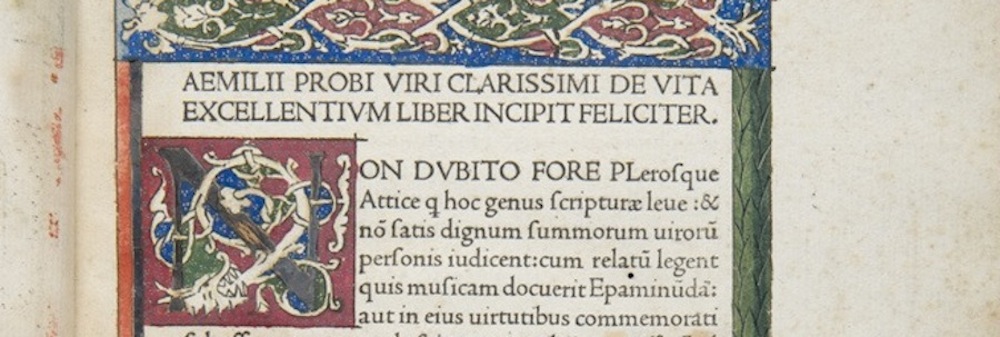Supplementary Essay for Nepos' Prologus to the Lives of Outstanding Commanders (Liber dē vītā excellentium imperātōrum)
In this short preface to his biographies of foreign generals, Nepos dedicates the work to his friend Titus Pomponius Atticus (ca. 109–ca. 32 BC) and warns that his readers should not be shocked to see celebrated foreigners engaging in behavior that would seem scandalous or reprehensible if undertaken by a Roman. Customs differ between nations, he says, since they arise from different national traditions.
Nepos suggests that some readers may find this kind of writing trivial (leve), a remark that can be understood as referring to biography per se, or to the particular challenge of writing biographies of generals, whose exploits were traditionally told in the serious genre of history. Despite this gesture of modesty, Nepos does employ some devices of the higher genre of history writing proper. The rhythm of the opening phrase, for example, is dactylic, the meter of epic: Nōn dŭbĭtō fŏrĕ plērōsque, Āttĭcĕ, quī hōc. Many historians begin their prose works with such a poetic flourish (e.g. Livy, Eutropius, and Tacitus), and formal Latin prose generally includes moments of metrical rhythm, especially at the beginning and end of long periods.
To seek out the best lessons of noble conduct, Nepos decided that he would not limit his biographies to notable Romans, but would present the noble characters of Romans and foreigners alike. Evaluating the morality and virtue of foreigners, however, presented a challenge. Nepos imagines a chauvinistic response from those unable to take seriously people who engaged in activities that upper-class male Romans generally agreed were disgraceful—such as dancing, or appearing on stage for the entertainment of the common people, or keeping their women cloistered in the house—or even unlawful, like marrying a close relative.
While Nepos’ tolerance of other cultural practices may strike the modern reader as refreshing, the differences in customs and behaviors mentioned by Nepos are ultimately shown to be superficial. Indeed, in Nepos’ view, cultural difference is an illusion that masks the common nature of all people: “the nature of all states is the same" (eandem omnium civitatum esse naturam).1 A Greek might dance or play the flute or marry his half-sister; but all good men—Greek, Roman, or even Carthaginian—display the universal virtues of intelligence, courage, and loyalty, and so reveal themselves as suitable models for the behavior of even the most upright Roman reader.
|
1. Nepos, Life of Miltiades 6. |

